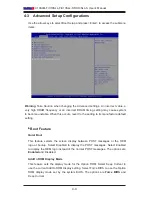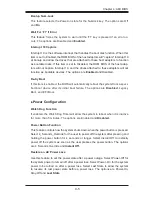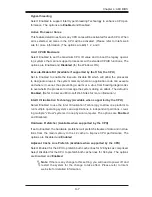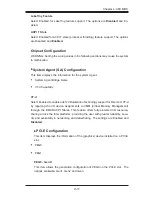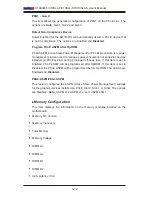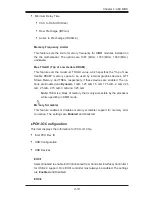
3-4
X10SLM-F/X10SLL-F/X10SLL-SF/X10SLL-S User’s Manual
3-3 Frequently Asked Questions
Question:
What type of memory does my motherboard support?
Answer:
The X10SLM-F_X10SLL-(F/SF/S) supports up to 32GB of unbuffered
ECC DDR3 DIMM (1.35V/1.5V, 1600/1333 MHz). See Section 2-4 for details on
installing memory.
Question:
How do I update my BIOS?
Answer:
We do NOT recommend that you upgrade your BIOS if you are not
experiencing any problems with your system. Updated BIOS files are located on
our website at
http://www.supermicro.com/support/bios/
. Please check our BIOS
warning message and the information on how to update your BIOS on our web
site. Select your motherboard model and download the BIOS ROM file to your
computer. Also, check the current BIOS revision to make sure that it is newer than
your BIOS before downloading. You may choose the zip file or the .exe file. If you
choose the zipped BIOS file, please unzip the BIOS file onto a bootable device or
a USB pen/thumb drive. To flash the BIOS, run the batch file named "ami.bat" with
the new BIOS ROM file from your bootable device or USB pen/thumb drive. Use
the following format:
F:\> ami.bat BIOS-ROM-filename.xxx <Enter>
Note:
Always use the file named “ami.bat” to update the BIOS, and insert
a space between "ami.bat" and the filename. The BIOS-ROM-filename
will bear the motherboard name (i.e., X10SLM-F_X10SLL-(F/SF/S)) and
build version as the extension. For example, "X10SLM-F_X10SLL-(F/
SF/S).115". When completed, your system will automatically reboot.
If you choose the .exe file, please run the .exe file under Windows to create
the BIOS flash floppy disk. Insert the floppy disk into the system you wish
to flash the BIOS. Then, boot the system to the floppy disk. The BIOS util
-
ity will automatically flash the BIOS without any prompts. Please note that
this process may take a few minutes to complete. Do not be concerned if
the screen is paused for a few minutes.
When the BIOS flashing screen is completed, the system will reboot and
will show “Press F1 or F2”. At this point, you will need to load the BIOS
defaults. Press <F1> to go to the BIOS setup screen, and press <F3> to
load the default settings. Next, press <F4> to save and exit. The system
will then reboot.
Warning
: Do not shut down or reset the system while updating the BIOS to prevent
possible system boot failure!





















